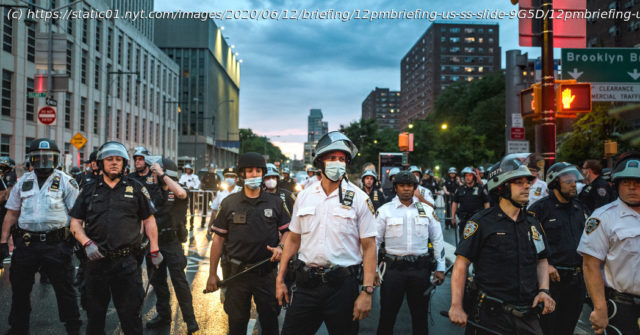Here’s what you need to know at the end of the day.
(Want to get this briefing by email? Here’s the sign-up.)
Good evening. Here’s the latest.
1. The sweeping calls for policing reforms are inching toward policy.
In New York, Gov. Andrew Cuomo signed an expansive package of bills aimed, in the wake of George Floyd’s death, at combating police misconduct. The measures included a ban on the use of chokeholds and a repeal of a decades-old statute that has allowed the police to keep disciplinary records of officers secret. Above, police in Brooklyn last week.
In Minnesota, where Mr. Floyd died after an officer pressed his knee into Mr. Floyd’s neck for nearly nine minutes, state lawmakers convened a special session to consider Democratic-backed bills that would create community alternatives to policing and restore voting rights for paroled prisoners. Republicans said they would oppose some of the measures.
And in Louisville, Ky., City Council members voted unanimously to ban “no-knock” warrants, a controversial procedure that the city’s police force used during the fatal shooting of Breonna Taylor in March.
2. Texas, Florida and California all recently reported their highest daily toll of new coronavirus cases, a concerning sign as the U. S. continues to reopen. Above, Long Beach, Calif.
The rise in cases helps explain why the nation continues to record more than 20,000 new cases a day even as some of the original hot spots, including New York, have seen drastic declines. Here’s where cases are rising the fastest.
The Centers for Disease Control and Prevention said the highest-risk gatherings are large, packed ones that draw people from outside the local area and where it is difficult for people to stay apart. The guidance came a day after Republicans moved President Trump’s convention speech to Jacksonville, Fla., after he demanded an event without social distancing rules.
3. And in Peru, the coronavirus toll is quickly turning tragic.
The crisis has exposed deep-rooted inequality and corruption that have thwarted pandemic response, making Peru one of the world’s worst coronavirus hot spots. The country has about 6,000 confirmed Covid-19 deaths and more than 200,000 infections, and experts say those numbers understate the true extent of the pandemic.
Poverty forced many to continue working; one in three Peruvians lacks access to running water, and only half of Peruvian homes have refrigerators, forcing many families to return daily to crowded markets. Above, a cemetery on the southern outskirts of Lima last month.






